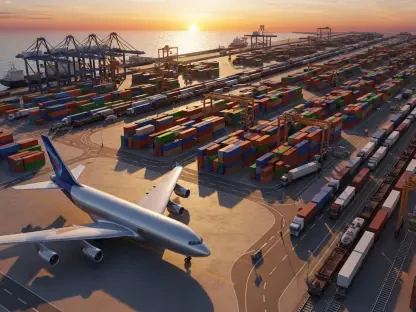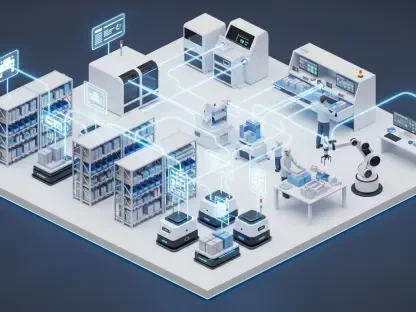Overview of the Logistics Sector in Africa
The logistics industry in Africa stands at a pivotal moment, grappling with inefficiencies that can inflate operational costs to as much as 75% of a product’s price. This sector, vital for economic growth and trade across the continent, faces significant hurdles due to fragmented supply chains and outdated systems. Despite these challenges, the potential for transformation is immense, as logistics serves as the backbone of commerce, connecting rural producers to urban markets and facilitating cross-border trade in a region eager for development.
Poor infrastructure remains a persistent barrier, with many regions lacking reliable roads or transport networks, leading to delays and increased expenses. High costs and regulatory complexities further compound the problem, often making logistics a bottleneck for businesses striving to scale. Yet, amidst these struggles, a wave of innovation is emerging, driven by technology and the determination of startups to rewrite the narrative of African trade.
Startups like Leta, Logidoo, and Jetstream are stepping into this space, leveraging digital tools to address systemic issues. These companies are not just adapting to challenges but are actively reshaping the industry by introducing efficiency where it has long been absent. Their efforts signal a broader shift, with technology, particularly artificial intelligence (AI), becoming a game-changer for logistics operations across the continent.
AI Innovations Driving Logistics Efficiency
Key AI Applications in Logistics
AI is revolutionizing logistics in Africa by tackling core operational inefficiencies with cutting-edge tools. Route optimization, powered by machine learning, analyzes traffic patterns, weather conditions, and delivery histories to chart the most efficient paths, slashing fuel costs and delivery times. Real-time tracking systems provide unprecedented visibility into shipments, addressing long-standing issues of delays and miscommunication by offering live updates on vehicle locations and cargo status.
Predictive analytics takes this further by forecasting potential disruptions, such as equipment failures or border delays, allowing companies to act proactively. Automated freight management, another critical application, simplifies the maze of cross-border documentation and compliance, reducing human error and expediting processes. Startups like Leta.ai and Swiftway Shippers exemplify this impact, with Leta cutting delivery times through smart routing and Swiftway automating customs clearance for smoother operations.
These technologies directly confront Africa-specific challenges, such as unpredictable traffic or cumbersome regulatory requirements. By integrating AI into their platforms, companies are achieving measurable gains—Leta, for instance, has expanded its delivery capacity from 500,000 to 4.5 million, while Swiftway has processed significant shipment values with streamlined systems. Such advancements highlight how AI is not just an add-on but a fundamental tool for operational success.
Market Impact and Growth Projections
The adoption of AI in logistics is yielding tangible results, with data showing up to 20% faster deliveries and 15% cost reductions for early adopters. These efficiency gains translate into stronger bottom lines for startups, enabling them to compete in a crowded market. Beyond immediate benefits, the broader economic implications are profound, as streamlined logistics can boost trade and attract investment to the region.
Investment in African AI startups reflects growing confidence in this sector, with $40 million raised in the current year alone, contributing to a cumulative $1.25 billion since earlier records. Projections indicate the African AI market could reach $16.5 billion by 2027, underscoring the immense growth potential for logistics-focused innovations. This financial momentum is fueling expansion plans for companies like Logidoo, which aims to enter 10 new countries, amplifying the reach of AI-driven solutions.
As funding continues to pour in, the scalability of these technologies becomes evident. Startups are not only solving local problems but also positioning themselves as regional leaders, capable of addressing the unique demands of diverse African markets. This trend suggests a future where AI could redefine the competitive landscape, making logistics a cornerstone of economic progress.
Barriers to AI Adoption in African Logistics
The path to widespread AI adoption in African logistics is fraught with obstacles, starting with the issue of poor data quality. Many businesses lack comprehensive, clean datasets on delivery records or inventory, which are essential for AI systems to function effectively. Without reliable information, even the most advanced algorithms struggle to deliver accurate predictions or optimizations.
High upfront costs for AI infrastructure pose another significant challenge, especially for early-stage startups with limited capital. Beyond initial investments, integration complexities and ongoing maintenance expenses can strain budgets, while inconsistent internet connectivity and power supply issues in some regions disrupt implementation. These infrastructural gaps often hinder the seamless operation of digital tools, slowing down progress.
Talent shortages in AI and data science exacerbate the situation, as skilled professionals are in short supply across the continent. Addressing these barriers requires strategic approaches, such as phased rollouts of AI systems to manage costs and partnerships with established tech providers to bridge expertise gaps. Collaborative efforts with local institutions could also help build capacity, ensuring sustainable adoption over time.
Regulatory and Compliance Considerations
Navigating the regulatory landscape in African logistics is a complex endeavor, with cross-border trade laws and customs requirements varying widely across countries. These regulations often lead to delays at borders, as manual processes for documentation and compliance checks consume valuable time. For startups, staying abreast of diverse legal frameworks adds another layer of operational difficulty.
AI tools are proving instrumental in alleviating these burdens, automating compliance tasks and reducing the risk of errors. Jetstream’s platform, for example, analyzes regulatory requirements in real-time, flagging potential issues before they cause delays, thus ensuring smoother transitions at border points. Such innovations demonstrate how technology can turn a logistical headache into a competitive advantage.
Data security and transparency remain critical concerns, especially as digital platforms handle sensitive information. Initiatives like AFRIKABAL in Rwanda, which integrates blockchain with AI, are setting new standards by enhancing trust and accountability in supply chains. Emphasizing secure, transparent systems will be essential as more companies adopt AI, ensuring compliance does not come at the expense of privacy or integrity.
The Future of AI in African Logistics
Looking ahead, AI is poised to become the backbone of supply chain operations in Africa, particularly in optimizing last-mile delivery. This critical segment, often plagued by inefficiencies in urban and rural areas, stands to benefit from AI-driven solutions that integrate informal transport networks into formal systems. Such advancements could dramatically improve access to goods in underserved regions.
Emerging trends point toward greater accessibility of AI through as-a-service platforms, which lower the entry barrier for smaller startups by offering scalable solutions without heavy investment. Partnerships with universities and tech hubs are also on the rise, addressing talent shortages by fostering a new generation of skilled professionals ready to drive innovation in logistics.
Global economic conditions and sustained funding momentum will likely shape the trajectory of this sector, encouraging continuous innovation. As African startups refine their use of AI, the focus will shift toward creating resilient, adaptable systems capable of withstanding regional challenges. This evolution promises not only operational efficiency but also a redefined role for logistics in continental trade dynamics.
Final Reflections and Path Forward
Reflecting on the journey, AI has carved a transformative path for African logistics startups, addressing deep-rooted inefficiencies with remarkable outcomes. The technology has tackled high costs and poor infrastructure head-on, delivering faster shipments and substantial savings, as evidenced by pioneers like Leta and Swiftway Shippers. These early successes underscore the potential for broader economic impact across the continent.
Looking to actionable next steps, startups should initiate pilot programs to test AI tools on a small scale, minimizing risks while building confidence in the technology. Prioritizing data quality through rigorous auditing and cleaning processes emerges as a non-negotiable foundation for effective implementation. Collaboration with established tech providers offers a practical route to access cutting-edge solutions without overextending resources.
Beyond immediate strategies, fostering long-term resilience through investment in local talent and infrastructure stands out as a critical consideration. By aligning with educational institutions and advocating for better connectivity, startups can lay the groundwork for sustained growth. The momentum of digital transformation in logistics points to an era of unprecedented opportunity, urging entrepreneurs to act decisively in shaping a more connected, efficient Africa.









